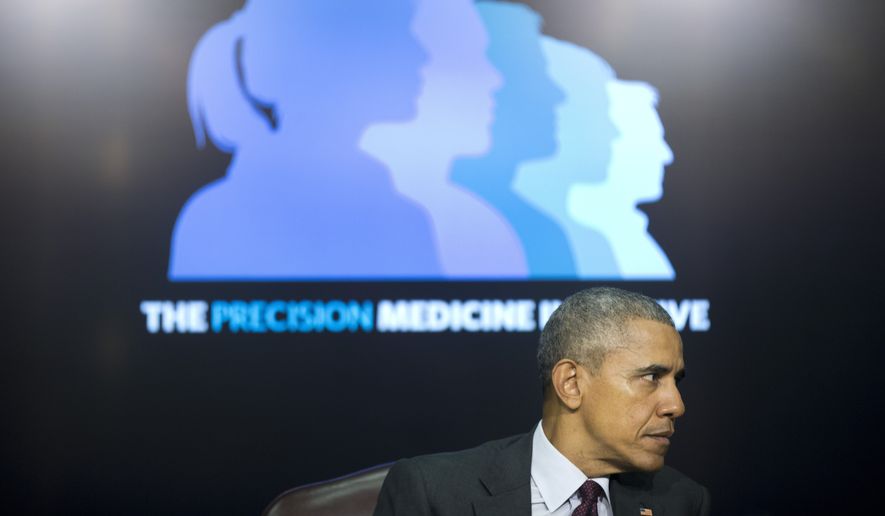The administration that couldn’t protect the FBI director’s personal information from hackers is looking for volunteers to turn over their genetic codes for a big government database to aid medical research.
One million volunteers, to be exact.
President Obama led a discussion at the White House on Thursday to promote his “precision medicine initiative,” which will use $200 million approved by Congress late last year to build a nationwide research participant group through the National Institutes of Health. The president said he hopes the program will revolutionize medical research to accelerate the search for cures for cancer, diabetes and other diseases.
“The key to all this is for us to be able to build up databases,” Mr. Obama said.
But the plan is also raising privacy concerns about the potential for cybertheft of sensitive health care data, which could be exploited for insurance fraud or financial identity theft, or simply result in an embarrassing invasion of patient privacy.
“It certainly gives me, and I’m sure the administration, concern about cybersecurity and privacy risk,” said Alexander Southwell, a former federal prosecutor of cybercrime. “The creation of this kind of database would be an attractive target for cybercriminals. We know from experience that the federal government in particular is not always up on the best efforts to protect data.”
The federal Office of Personnel Management acknowledged in June that personal information for as many as 21.5 million current and former government employees — including Social Security numbers — was stolen in two related attacks on its computer system.
FBI Director James B. Comey, who called the hacks an “enormous breach,” said his own data were stolen. U.S. authorities blamed China, which eventually announced it had arrested several hackers in connection with the attack.
Steven Bucci, a former top Pentagon official and visiting research fellow at the conservative Heritage Foundation, said the medicine initiative “is a bigger story than just the database.”
“One of big initiatives of this administration is to push everybody into using electronic health records,” Mr. Bucci said. “From a medical care standpoint, it’s a huge step forward. From a security standpoint, you lose an element of control even among the ’good guys.’ Then you throw in the hackers, the criminals, people from other countries who might want that information. It has to be protected, and our federal government hasn’t exactly covered itself with glory in its ability to protect large databases.”
Mr. Obama said the program must include “strong privacy protections.”
“We’ve got to figure out how do we make sure that if I donate my data to this big pool that it’s not going to be misused, that it’s not going to be commercialized in some way that I don’t know about,” the president said. “And so we’ve got to set up a series of structures that make me confident that if I’m making that contribution to science, that I’m not going to end up getting a bunch of spam targeting people who have a particular disease I may have.”
After Mr. Obama announced the program in January 2015, the White House’s office of science and technology policy began working with an interagency group to develop “privacy and trust principles” to guide the effort. An administration official said the guidelines are built into every step of the program.
White House press secretary Josh Earnest wouldn’t offer a guarantee that private genetic data cannot be stolen but said protecting the information is “a top presidential priority.”
“We’re certainly going to work with the private sector but also use the best government experts to make sure that this data is protected,” he said. “We’ve got experts who are very focused on this.”
The initiative will attempt to tailor medical treatments to individuals, based in part on their genetic makeup. Vanderbilt University in Nashville has won an award to perform a pilot study on how to recruit participants directly.
This summer, more awards will go to health care providers to recruit most of the participants. The NIH later will announce a center to coordinate the program and operate a DNA biobank.
The president said the program is evidence of “an incredibly exciting time in medicine.”
“What we’re now seeing is the possibility of us identifying diseases, targeting them, individualizing treatments for a particular patient, and operating with the kind of precision that promises to reduce costs, provide much better care, make our entire health care system much more effective,” Mr. Obama said.
• Dave Boyer can be reached at dboyer@washingtontimes.com.




Please read our comment policy before commenting.